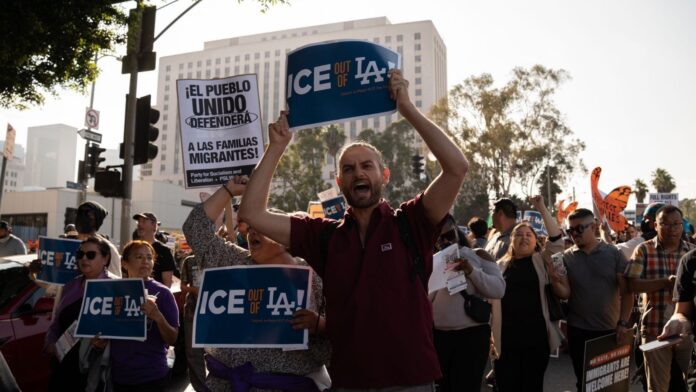Los Angeles has witnessed significant unrest in the wake of extensive Immigration and Customs Enforcement (ICE) operations that led to the detention of over one hundred individuals last week. These coordinated raids targeted multiple workplaces across the county, prompting large-scale protests marked by road blockades, vehicle arson, and confrontations with law enforcement and National Guard personnel amid the use of tear gas and less-lethal munitions.
In a decisive escalation, President Trump authorized the deployment of approximately 2,000 National Guard troops to Los Angeles without the consent of California state officials. Governor Gavin Newsom condemned this move as an unlawful federal overreach and a violation of state sovereignty. The President framed the unrest as a response to an alleged threat posed by immigration-related activities, asserting federal responsibility to restore order.
The protests have turned highly volatile, with downtown areas, including near City Hall and detention facilities, becoming focal points of clashes. Law enforcement declared unlawful assemblies and reported multiple arrests alongside injuries to both officers and civilians. The deployment of tear gas, flashbangs, and rubber bullets has further intensified the confrontations.
Underlying the disturbances is a complex ideological mix, blending nationalist rhetoric with opposition to global capitalism and expressing solidarity with international causes critical of Western policies. Protesters’ slogans and banners indicate alignment with anti-colonial and anti-imperialist movements, further complicating the local security challenge. Authorities have attributed much of the violence to provocateurs seeking to escalate tensions.
President Trump defended the federal intervention as necessary under existing laws to uphold public safety, emphasizing readiness to utilize active-duty military forces should the situation deteriorate further. The President has also criticized local officials for allegedly permitting disorder and has called for stringent actions against masked protesters.
Despite the heavy security presence and heightened tensions, protest leaders from various immigrant rights organizations have vowed to maintain peaceful yet resolute demonstrations, condemning what they describe as state-sponsored repression.
The evolving crisis in Los Angeles encapsulates broader national debates on immigration enforcement, federal-state relations, and the ideological divisions shaping American society today. The city remains a critical stage for these contested issues, with potential implications for governance and civil stability.

